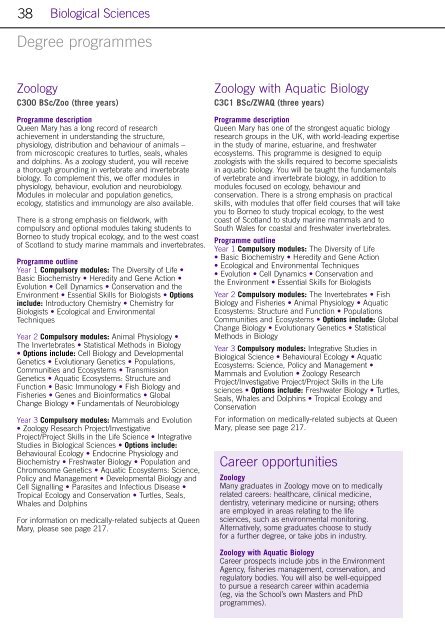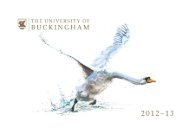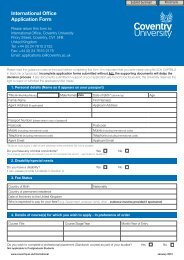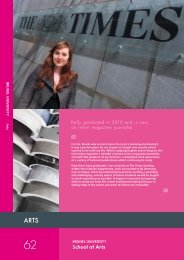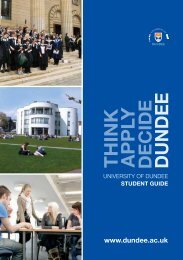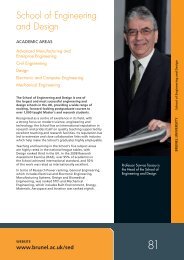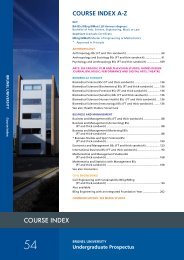student profile
student profile
student profile
You also want an ePaper? Increase the reach of your titles
YUMPU automatically turns print PDFs into web optimized ePapers that Google loves.
38<br />
Biological Sciences<br />
Degree programmes<br />
Zoology<br />
C300 BSc/Zoo (three years)<br />
Programme description<br />
Queen Mary has a long record of research<br />
achievement in understanding the structure,<br />
physiology, distribution and behaviour of animals –<br />
from microscopic creatures to turtles, seals, whales<br />
and dolphins. As a zoology <strong>student</strong>, you will receive<br />
a thorough grounding in vertebrate and invertebrate<br />
biology. To complement this, we offer modules in<br />
physiology, behaviour, evolution and neurobiology.<br />
Modules in molecular and population genetics,<br />
ecology, statistics and immunology are also available.<br />
There is a strong emphasis on fieldwork, with<br />
compulsory and optional modules taking <strong>student</strong>s to<br />
Borneo to study tropical ecology, and to the west coast<br />
of Scotland to study marine mammals and invertebrates.<br />
Programme outline<br />
Year 1 Compulsory modules: The Diversity of Life •<br />
Basic Biochemistry • Heredity and Gene Action •<br />
Evolution • Cell Dynamics • Conservation and the<br />
Environment • Essential Skills for Biologists • Options<br />
include: Introductory Chemistry • Chemistry for<br />
Biologists • Ecological and Environmental<br />
Techniques<br />
Year 2 Compulsory modules: Animal Physiology •<br />
The Invertebrates • Statistical Methods in Biology<br />
• Options include: Cell Biology and Developmental<br />
Genetics • Evolutionary Genetics • Populations,<br />
Communities and Ecosystems • Transmission<br />
Genetics • Aquatic Ecosystems: Structure and<br />
Function • Basic Immunology • Fish Biology and<br />
Fisheries • Genes and Bioinformatics • Global<br />
Change Biology • Fundamentals of Neurobiology<br />
Year 3 Compulsory modules: Mammals and Evolution<br />
• Zoology Research Project/Investigative<br />
Project/Project Skills in the Life Science • Integrative<br />
Studies in Biological Sciences • Options include:<br />
Behavioural Ecology • Endocrine Physiology and<br />
Biochemistry • Freshwater Biology • Population and<br />
Chromosome Genetics • Aquatic Ecosystems: Science,<br />
Policy and Management • Developmental Biology and<br />
Cell Signalling • Parasites and Infectious Disease •<br />
Tropical Ecology and Conservation • Turtles, Seals,<br />
Whales and Dolphins<br />
For information on medically-related subjects at Queen<br />
Mary, please see page 217.<br />
Zoology with Aquatic Biology<br />
C3C1 BSc/ZWAQ (three years)<br />
Programme description<br />
Queen Mary has one of the strongest aquatic biology<br />
research groups in the UK, with world-leading expertise<br />
in the study of marine, estuarine, and freshwater<br />
ecosystems. This programme is designed to equip<br />
zoologists with the skills required to become specialists<br />
in aquatic biology. You will be taught the fundamentals<br />
of vertebrate and invertebrate biology, in addition to<br />
modules focused on ecology, behaviour and<br />
conservation. There is a strong emphasis on practical<br />
skills, with modules that offer field courses that will take<br />
you to Borneo to study tropical ecology, to the west<br />
coast of Scotland to study marine mammals and to<br />
South Wales for coastal and freshwater invertebrates.<br />
Programme outline<br />
Year 1 Compulsory modules: The Diversity of Life<br />
• Basic Biochemistry • Heredity and Gene Action<br />
• Ecological and Environmental Techniques<br />
• Evolution • Cell Dynamics • Conservation and<br />
the Environment • Essential Skills for Biologists<br />
Year 2 Compulsory modules: The Invertebrates • Fish<br />
Biology and Fisheries • Animal Physiology • Aquatic<br />
Ecosystems: Structure and Function • Populations<br />
Communities and Ecosystems • Options include: Global<br />
Change Biology • Evolutionary Genetics • Statistical<br />
Methods in Biology<br />
Year 3 Compulsory modules: Integrative Studies in<br />
Biological Science • Behavioural Ecology • Aquatic<br />
Ecosystems: Science, Policy and Management •<br />
Mammals and Evolution • Zoology Research<br />
Project/Investigative Project/Project Skills in the Life<br />
sciences • Options include: Freshwater Biology • Turtles,<br />
Seals, Whales and Dolphins • Tropical Ecology and<br />
Conservation<br />
For information on medically-related subjects at Queen<br />
Mary, please see page 217.<br />
Career opportunities<br />
Zoology<br />
Many graduates in Zoology move on to medically<br />
related careers: healthcare, clinical medicine,<br />
dentistry, veterinary medicine or nursing; others<br />
are employed in areas relating to the life<br />
sciences, such as environmental monitoring.<br />
Alternatively, some graduates choose to study<br />
for a further degree, or take jobs in industry.<br />
Zoology with Aquatic Biology<br />
Career prospects include jobs in the Environment<br />
Agency, fisheries management, conservation, and<br />
regulatory bodies. You will also be well-equipped<br />
to pursue a research career within academia<br />
(eg, via the School’s own Masters and PhD<br />
programmes).


